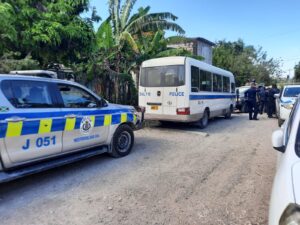
‘Send children to schools closest to them’, says Peart
MANDEVILLE, Manchester — Michael Peart has been talking about the issue for so long, he says he feels like a stuck record.
‘For many, many years I’ve been saying children shouldn’t be travelling these long distances to go to school, they should be going to the school closest to them,’ Peart, told Jamaica Observer Central by telephone.
“Is only when you have a tragedy with schoolchildren, like happen up at Chudleigh that people pay me any mind,” added Peart, who is Member of Parliament for South Manchester and Speaker of the House of Representatives.
Four teenagers, Okeem Gordon, Tameka Peart, Kimone Levy, and Shackerea Meschette — all students of the Holmwood Technical High School in Christiana — died on September 25 in a bus crash at Chudleigh, north Manchester.
One driver, alleged to have triggered the accident with improper overtaking, is before the courts on manslaughter charges. However, for Peart who is particularly touched since one of the accident victims, Gordon is from Alligator Pond, at the southern tip of his constituency, such tragedies could be minimised if there is a rigorous and proactive effort to reduce long-distance travel for children.
Young Gordon had been required to travel about 60 miles every day — 30 miles either way to and from school — with a switch of vehicle in Mandeville.
In addition to the risk of accidents, Peart points to the stress and strain for children and the cost of fares which means they are often held back from school simply because there is no money.
“They (children) have to get up extra early and reach home very late. They miss a lot of school when the money runs out… every aspect is negative, there is no benefit for the child,” said Peart.
He blames the “elitist traditional system” which facilitates parents who want to send children to the so-called “traditional” and “best” high schools for the problem. “In South Manchester, there are Cross Keys High and Winston Jones High as well as BB Coke in (nearby) Junction, South East St Elizabeth,” Peart said.
However, he said, the children who get high scores in the Grade Six Achievement Test (GSAT) and Grade Nine Achievement Test (GNAT) have to travel to the traditionally recognised high schools in Mandeville and beyond.
“At the same time, those buses pass the others coming down from Mandeville with children who got low scores and who are being sent to Cross Keys High and Winston Jones… those children didn’t want to come down to South Manchester, they were shunted there by the system,” said Peart.
He complains that while the benefits of sending children to schools closest to them are obvious for all to see, there are too many, including school principals, who do not want change.
For what its worth, the South Manchester MP says he is again calling on the Ministry of Education to “develop a plan to implement the zoning of schools on a phased basis”. He concedes that once the programme is developed, “some people will resist” but for the good of the children, Peart says it must be implemented even while he concedes “it will take time, it cant be done overnight”.
One man in Peart’s corner is Education Minister Ronnie Thwaites. Since becoming minister in early 2012, Thwaites has repeatedly spoken of the desirability of children being placed geographically close to home.
He repeated that ideal when the Observer Central spoke to him last week but emphasised that parents also had a right to choose what they consider to be best for their children.
“The negative manifestations [of long travel for school children] are very obvious… [but] there is a very strong parental aspect…,” said Thwaites who will be in Mandeville today to witness the implementation of a regularised bus system by Holmwood Technical.
The education minister says a large part of the solution must be to strengthen the performance of the “new” high schools. He claims strong leadership in some of those schools is “making a big difference” in terms of results; and parents are starting to notice.
“I believe attitudes are changing… for instance there are far fewer applications for transfers than used to be the case and I think that’s because parents are recognising that children are doing very well at these schools,” he said.
Thwaites says his ministry will also be exploring a strategy of students on the PATH programme “being placed at schools closest to them” as a first option in order to minimise if not eliminate the high cost of travel.


























